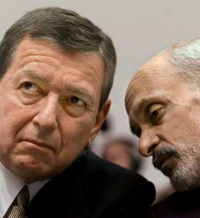
U.S. Deputy Attorney General Michael Chertoff counsels Attorney General John Ashcroft, suggesting he not mention "the federal 'reform' camp idea."
United States Attorney General John Ashcroft went before the House Judiciary Committee on Monday, seeking vast changes in law enforcement efforts. Ashcroft claimed that the U.S. would remain vulnerable to terrorist attacks until his powers were enacted.
Among the changes Ashcroft seeks include the ability to detain "dirty foreigners" suspected of being linked to terrorists for an indefinite period of time and with no appeal. The Bush administration also seeks to make wiretap evidence obtained in other countries that violate the Fourth Amendment to be admissible in court.
In addition, the administration wants secret court authorization for wiretaps, longer jail sentences for terrorists, and access to users' Internet accounts without a court order. They also seek to review voice mail messages with only a search warrant.
Ashcroft also expressed his desire for placing small video cameras in the homes of U.S. citizens so "that we may observe their actions and protect them from harm." He did, however, rule out the possibility of stationing federal agents in the closets of Americans "because the logistics and manpower requirements would be too much to deal with."
The changes sought have made some pause to consider the privacy of American citizens, which is quite vulnerable in the wake of the terrorist attacks.
"Past experience has taught us that today's weapon against terrorism may be tomorrow's law against law-abiding Americans" Rep. John Conyers (D-MI) said, and claimed he was "deeply troubled" by the constitutional implications.
Ashcroft scoffed at such suggestions, saying that all measures would pass "constitutional muster" though he admitted "that the Bill of Rights might have to be gutted like a hog ripe for slaughter."
After Ashcroft finished speaking, civil liberty advocates such as the American Civil Liberties Union and People For The American Way were asked to speak as well. In a sinister turn, Republicans ordered all video coverage, including C-SPAN, to leave, violating House rules which state that committee meetings open to the public must be open to coverage by audio and video.
Such propaganda-like tactics are causing some to question just how much freedom Americans stand to lose under the Bush administration.
"The people of this country shouldn't worry," said Ashcroft following his speech, "because once we begin requiring honest citizens to get barcode tattoos and chip implants that allow us to easily identify and track them, things will get back to normal."

